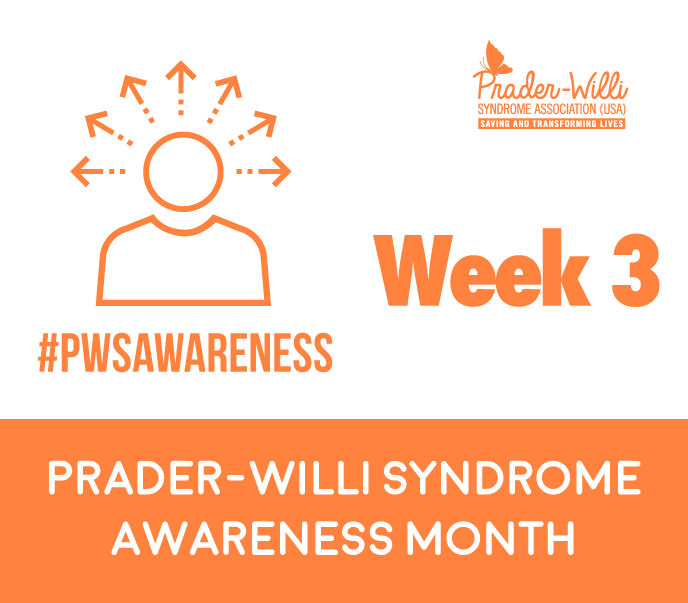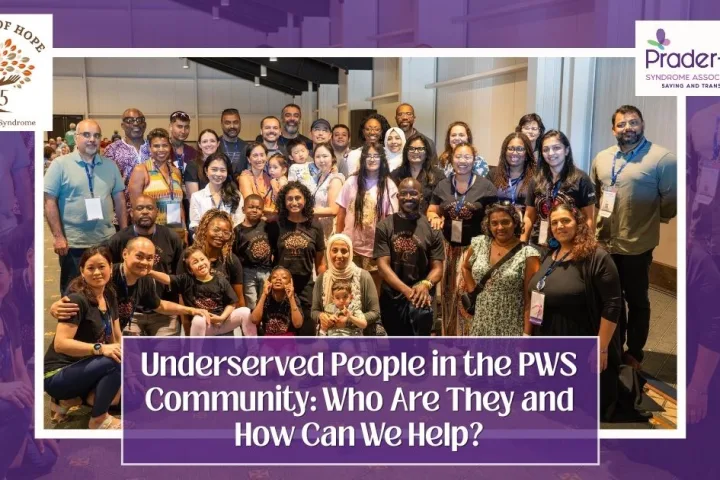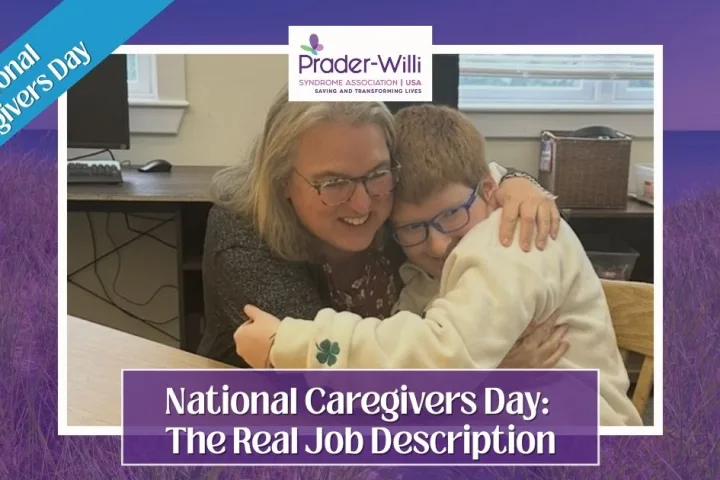Not on social media? No problem! PWSA (USA)’s daily PWS Awareness Month posts are available right here for you to access anytime.
Day 20
Hypogonadism (a condition in which the testicles are not working the way they should) and cryptorchidism (undescended testes) are both common newborn males with PWS and can lead to delayed puberty and infertility. A study that looked at the long-term effects of orchidopexy (corrective surgery for undescended testicles) in children with PWS found the surgery to be only minimally successful, therefore parents will want to carefully consider the risks verses benefits of this treatment option.
Day 21
The “Normal” body temperature in individuals with PWS can vary significantly from one person to the next. It is important to know your loved one’s usual “healthy” temperature which can be established by monitoring his or her temperature under different circumstances and at different times. In addition, individuals with PWS can easily become too hot or too cold meaning keeping comfortable might require wearing clothing in layers to allow for easy adjustments.
Day 22
A 2018 research study found children and adolescents with PWS experienced reduced salivary secretion, increased salivary viscosity, and mouth breathing. Investigators recommended that individuals with PWS have dental care focused on the prevention and treatment of tooth wear and gingivitis and limiting the negative influence of reduced saliva. Salivary secretion stimulation can be improved by the application of topical fluoride treatments and chewing sugar-free gum containing xylitol and CPP-ACP.
Day 23
Some clinicians suggest growth hormone (GH) therapy is contraindicated in the presence of scoliosis. However, a multicenter randomized controlled trial found no difference in onset or curve progression between children undergoing GH treatment and those children not on GH. In fact, some children treated with GH experienced less severe scoliosis suggesting a protective effect of GH treatment.
Day 24
Skin picking is a common behavior seen in people with Prader-Willi syndrome (PWS). Intensity and duration vary from person to person and each episode might be different. For some, stress is a contributing factor to an individual’s tendency to engage in skin picking. If the source of stress can be removed, skin picking should also reduce. Remember, though, that skin picking can become habitual and repetitive meaning it might take time to cease altogether. Refer to Medical A-Z on the PWSA (USA) website for ways to prevent and control skin picking behaviors.





 Perry A. Zirkel has written more than 1,500 publications on various aspects of school law, with an emphasis on legal issues in special education. He writes a regular column for NAESP’s Principal magazine and NASP’s Communiqué newsletter, and he did so previously for Phi Delta Kappan and Teaching Exceptional Children.
Perry A. Zirkel has written more than 1,500 publications on various aspects of school law, with an emphasis on legal issues in special education. He writes a regular column for NAESP’s Principal magazine and NASP’s Communiqué newsletter, and he did so previously for Phi Delta Kappan and Teaching Exceptional Children. Jennifer Bolander has been serving as a Special Education Specialist for PWSA (USA) since October of 2015. She is a graduate of John Carroll University and lives in Ohio with her husband Brad and daughters Kate (17), and Sophia (13) who was born with PWS.
Jennifer Bolander has been serving as a Special Education Specialist for PWSA (USA) since October of 2015. She is a graduate of John Carroll University and lives in Ohio with her husband Brad and daughters Kate (17), and Sophia (13) who was born with PWS. Dr. Amy McTighe is the PWS Program Manager and Inpatient Teacher at the Center for Prader-Willi Syndrome at the Children’s Institute of Pittsburgh. She graduated from Duquesne University receiving her Bachelor’s and Master’s degree in Education with a focus on elementary education, special education, and language arts.
Dr. Amy McTighe is the PWS Program Manager and Inpatient Teacher at the Center for Prader-Willi Syndrome at the Children’s Institute of Pittsburgh. She graduated from Duquesne University receiving her Bachelor’s and Master’s degree in Education with a focus on elementary education, special education, and language arts. Evan has worked with the Prader-Willi Syndrome Association (USA) since 2007 primarily as a Crisis Intervention and Family Support Counselor. Evans works with parents and schools to foster strong collaborative relationships and appropriate educational environments for students with PWS.
Evan has worked with the Prader-Willi Syndrome Association (USA) since 2007 primarily as a Crisis Intervention and Family Support Counselor. Evans works with parents and schools to foster strong collaborative relationships and appropriate educational environments for students with PWS. Staci Zimmerman works for Prader-Willi Syndrome Association of Colorado as an Individualized Education Program (IEP) consultant. Staci collaborates with the PWS multi-disciplinary clinic at the Children’s Hospital in Denver supporting families and school districts around the United States with their child’s Individual Educational Plan.
Staci Zimmerman works for Prader-Willi Syndrome Association of Colorado as an Individualized Education Program (IEP) consultant. Staci collaborates with the PWS multi-disciplinary clinic at the Children’s Hospital in Denver supporting families and school districts around the United States with their child’s Individual Educational Plan. Founded in 2001, SDLC is a non-profit legal services organization dedicated to protecting and advancing the legal rights of people with disabilities throughout the South. It partners with the Southern Poverty Law Center, Protection and Advocacy (P&A) programs, Legal Services Corporations (LSC) and disability organizations on major, systemic disability rights issues involving the Individuals with Disabilities Education Act (IDEA), Americans with Disabilities Act (ADA), and the federal Medicaid Act. Recently in November 2014, Jim retired.
Founded in 2001, SDLC is a non-profit legal services organization dedicated to protecting and advancing the legal rights of people with disabilities throughout the South. It partners with the Southern Poverty Law Center, Protection and Advocacy (P&A) programs, Legal Services Corporations (LSC) and disability organizations on major, systemic disability rights issues involving the Individuals with Disabilities Education Act (IDEA), Americans with Disabilities Act (ADA), and the federal Medicaid Act. Recently in November 2014, Jim retired.